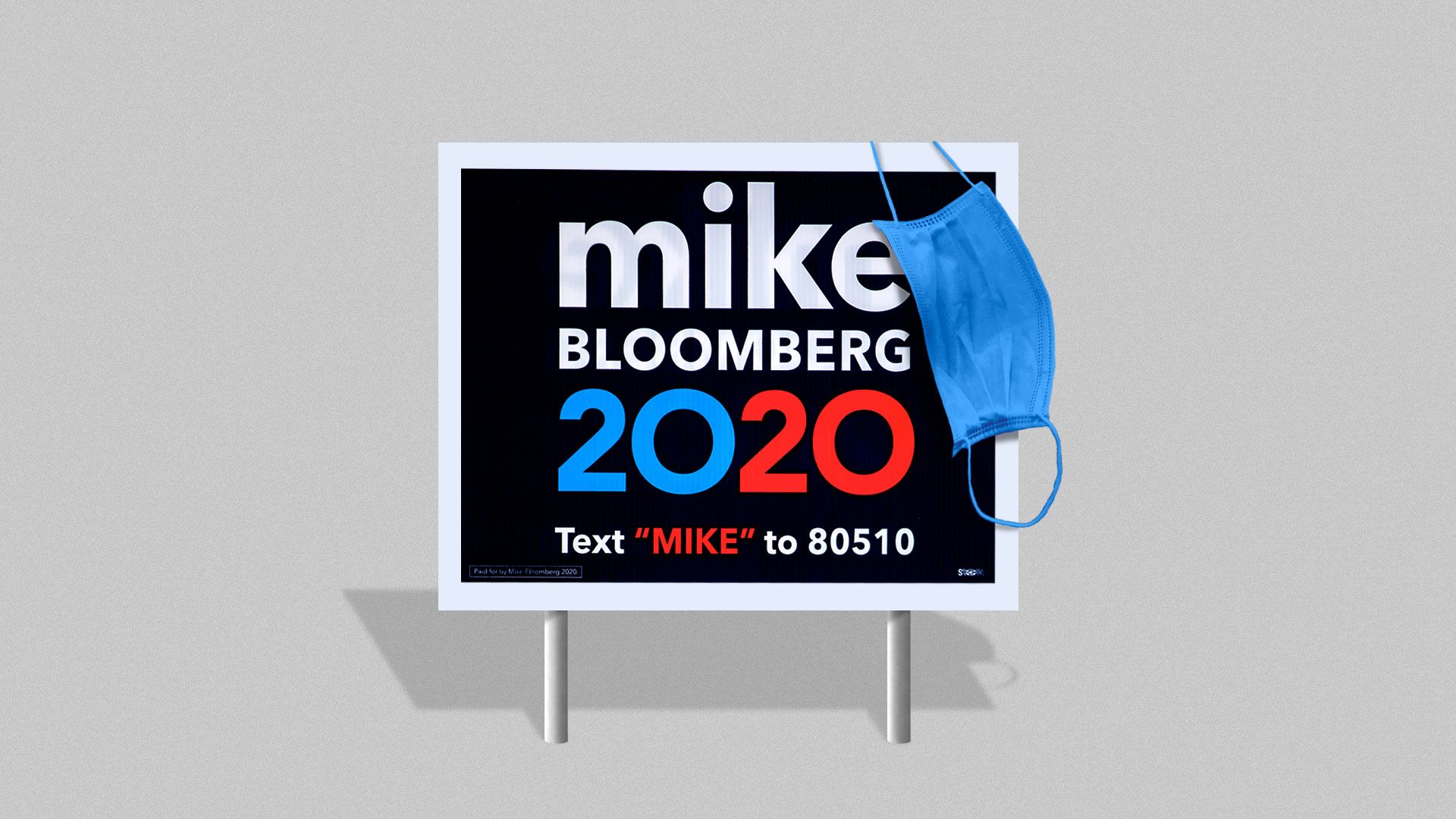Michael Bloomberg's coronavirus pivot
Add Axios as your preferred source to
see more of our stories on Google.

Illustration: Eniola Odetunde/Axios
Less than a week after dropping out of the presidential race, Michael Bloomberg announced his next major initiative: an online network of mayors and public health experts to help communities deal with the coronavirus.
Why it matters: Two months in, it's serving as a welcome reset for Bloomberg after a rocky campaign. He's welcomed high-profile speakers — Bill Clinton, George W. Bush, Barack Obama, Bill Gates and Nancy Pelosi — onto weekly calls with mayors to share their own lessons learned while dealing with crises in office. Joe Biden is expected to give remarks on Thursday's call.
- This allows the billionaire businessman and philanthropist to revisit his most successful political role — longtime New York City mayor — while re-establishing himself as a champion for cities in crisis mode.
Details: For a network of nearly 400 mayors from around the world, the weekly two-hour Zoom calls have become their primary avenue for getting public health updates and sharing successes and hurdles in their own communities.
- Experts from Harvard and Johns Hopkins — which have partnered with his foundation, Bloomberg Philanthropies, on the effort — have led discussions on best practices for dealing with mental health challenges and tips for managing conflict and reaching consensus with colleagues.
- Mayors on the call use a chat box to ask each other questions, make comments or ask for ideas for a particular problem they're facing. That often leads to offline collaboration between cities and running text-message conversations, participants said.
Bloomberg said the local response initiative is more of a continuation of his foundation's longtime work with cities than a change in direction. In emailed responses to questions from Axios, he said that the effort is about leadership, not politics.
"The insights that come with crisis management experience are useful to every mayor. Partisan politics is a very dangerous thing in a crisis ... Mayors are leading with facts and data and science."— Michael Bloomberg
What they're saying: "Even though we're all battling the same virus and the same monster, there are so many differences across the country in how it's going and what mayors are being asked — or in some cases, told — to do," said Paul TenHaken, the Republican mayor of Sioux Falls, S.D.
- The discussion, he said, "reassures me that there are other people trying to figure out this response as we go just like me."
- Other mayors — Scott Brook of Coral Springs, Fla., Rick Kriseman of St. Petersburg, Fla., Andre Sayegh of Paterson, N.J., and Melvin Carter of St. Paul, Minn. (all Democrats)— say they've put to use the advice offered on effectively communicating with their constituents and using data to drive policies.
- "It seems cliché now to say these times are unprecedented but they really are," Carter said. "Having a real playbook is dependent on learning the lessons of other mayors."
Bloomberg Philanthropies has spearheaded several other efforts focusing on the urban response to COVID-19.
- For example, it's partnered with the National Association of City Transportation Officials to launch a resource hub connecting local officials with real-time information about transportation strategies cities are adapting as a result of the virus.
- With the National League of Cities, it launched a local action tracker to share new COVID-19-related policies put in place across the country.
The local response initiative has filled a void where federal and, in some cases, state officials, have fallen short, participating mayors tell Axios.
- The network is an extension of the Bloomberg Harvard City Leadership Initiative, which started in 2016 and has had three classes of mayors and city leaders participate in a year-long program.
The other side: Bloomberg received endorsements during his presidential campaign from the mayors of cities his foundation has helped over the years through grants and other strategic support — but also some criticism that he was calling in favors for past assistance.
- Some residents have expressed concern that the platform is pushing a political agenda down to local leaders, said TenHaken of Sioux Falls.
- "I've had to explain that there's not a Bloomberg political agenda, it's just a desire to give us the tools to lead," TenHaken said. "The coronavirus is not an R or a D issue — it's a public health issue. We're all paddling the boat in the same direction."
Behind the scenes: Columbia, S.C., Mayor Steve Benjamin, who was a co-chair of Bloomberg's national campaign, said it wasn't a surprise for Bloomberg to shift so quickly to the coronavirus response after dropping out of the race.
- "He was really dialed in on coronavirus on the last several weeks of the campaign," Benjamin told Axios. "Even he would say his finest moments were responding to crises, birthed in the tragedy of 9/11 in New York City."
